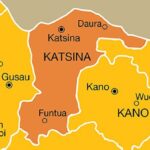A recent exclusive report by Daily Trust says security agencies have begun to track down and arrest individuals and businesses involved in suspicious financial transactions that have kept terrorism alive in the country. No doubt, this is a positive development. Security operatives involved in the crackdown acted on a tip-off from the United Arab Emirates (UAE), where some Nigerians were arrested, investigated and jailed over terrorism financing.
Complex investigative activities by the Department of State Security (DSS), Defense Intelligence Agency (DIA), Nigerian Financial Intelligence Unit (NFIU), and the Central Bank of Nigeria (CBN) have led to the arrest of over 400 persons in Kano, Borno, Abuja, Lagos, Sokoto, Adamawa, Kaduna and Zamfara. As evidence of a significant breakthrough in tracking financiers of terrorists, the report said, “the main person coordinating the funding ring for Boko Haram is in our custody; he and his closest ally in the business.”
- B/Haram financing: No secret trial for arrested BDC operators, Ndume tells FG
- Nigeria facing asymmetric, emerging security threats – Defence minister
This feat is coming more than a decade after terrorism bared its fangs in Nigeria. It may be coming very late in the day, but it is a crucial aspect of counter-terrorism strategies that must be taken seriously. Our security operatives must go beyond probing Bureaux de Change (BDCs) as a strategy, if their objective is to block the sources of funding for Boko Haram, bandits, kidnappers for ransom and even separatists. Organised criminal gangs have various channels through which they access funds in and outside their countries of operations, some of them through legal means and many others through illegal means.
In terms of transactions that look legal, some terrorist groups are funded by states which give contracts to companies that are associated with terrorist groups. It is possible that some companies that access federal and state government contracts sympathise with terrorist groups, hence part of what such companies earn as profit from doing business with government is channeled into terrorist activities. This could be done by even a foreign government. There are also individual and corporate donor agencies that support terrorist organisations in the name of humanitarian aids. Ethnic or religious organizations, which consider the activities of terrorist groups as a reaction to victimhood, could also make financial contributions for such terrorist organisations, as a show of commitment to their cause.
Illegal sources of funds for terrorists are numerous. They include drug trafficking; smuggling of goods, including mineral resources like crude oil and gold; arms and human trafficking; informal money transfer system; money laundering; illegal tax collection on goods and services in areas under their control, and the like. This means security operatives have their job well cut out for them, because they must extend their dragnet wider than BDCs. They must go as far as verifying the activities of promoters of companies that benefit from government contracts, and even the persuasions of individuals who aspire to political positions. If a politician who sympathises with terrorist organisations ascends to a political position, he or she would, no doubt, become a channel of funding for the evil group.
We call on government to be courageous in tracking the sources of funding for terror groups because Boko Haram, bandits and kidnappers survive as long as they have unfettered cash flow. If necessary, government should amend the Nigeria Terrorism Prevention Act (2013) to accommodate measures that would allow security agencies to scrutinize the activities of persons suspected to be in bed with terror groups. In the West, a law restricting the amount of US Dollars any individual could carry in cash on a foreign trip was promulgated in an attempt to battle money laundering, one of the sources for funding terror groups. It is, therefore, not out of place for Nigeria to put in place local laws to address terrorism financing. Also, government must work, collaborate with and learn from foreign organisations set up to block cash flow to terrorists. Some of those measures could be adopted in Nigeria, especially if they could address how the evil financial flow manifests in Nigeria.
We encourage security operatives to be diligent in gathering information that would lead to the prosecution of persons involved in funding terror groups, just as we urge them to be careful to avoid picking up innocent persons in the process.

 Join Daily Trust WhatsApp Community For Quick Access To News and Happenings Around You.
Join Daily Trust WhatsApp Community For Quick Access To News and Happenings Around You.


